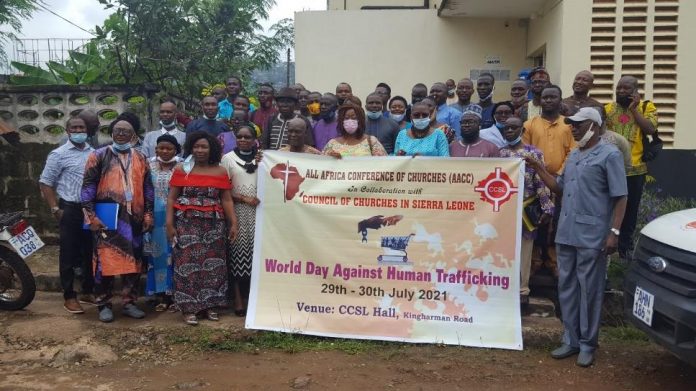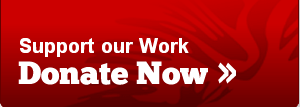The All Africa Conference of Churches (AACC) in collaboration with Council of Churches in Sierra Leone (CCSL) and the Government of Sierra Leone have observed World Day Against Human Trafficking.
The day was observed during a two days’ training workshop for Heads of Churches and Youth Leaders on the 29th – 30th July 2021 at the CCSL Hall, Kingharman Road, Freetown.
The President of CCSL Rev. Henry A. Samuels pointed out that the workshop aimed at empowering faith actors to address the problem of illegal migration and human trafficking.
He said they are pleased to have in their presence ministers of government, and all other stakeholders as the talk about all important matter affecting the lives of citizens, and the world at large, especially children, youth and women.
He disclosed that the history of CCSL involving in the field of advocacy, engaging in various interventions in the nation and beyond has contributed and is still contributing to peace, stability, education, and the overall development of God’s creation.
“We’re obligated to identify ourselves with this ancient issue of migration. As we join hands with many who have in the past fought against the criminal act of illegal migration. In the Bible we see various forms of migration, both legal and illegal. Abraham was asked by God to migrate, so that he and his descendants would be blessed, Joseph was illegally sold to slavery by his own brothers, but he later welcome them into the foreign land of Egypt were they settled as legal migrants. Even from time to time the children of Israel were forced to go into exile. Even the baby Jesus and his parents migrated in order to save life.”
He recalled that between 1500 and 1860s at least 12 million Africans were shipped to America illegally.
He added that in recent times, they have witnessed an upsurge in illegal migration and human traffickin, noting that some of it is done through agents and others offer themselves voluntarily.
As a Council, he emphasized they are concerned about the increase in illegal migration and human trafficking within and outside their borders.
“Some of the issues that can be attributed to this are the following: Lack of inadequate opportunity in our rural communities, such as access to quality education, health and business, lack of basic facilities like good words, clean drinking water, electricity, communication, and even recreation, poverty is another factor, people cannot produce enough to feed their families. Yet more to cater for others and lack of knowledge.”
President of AACC, Rt. Rev. Arnold C. Temple said the AACC through it African Union Coordinating Office in Addis Ababa is committed to working with the AU and through its 204 member churches in 43 African countries for the implementation of the aspirations.
He described human trafficking as pandemic and that it is the resurfacing of the slave trade that they thought ended in the 19th century.
“It is a trade that is booming, and the industry is set to generate over 150 billion US dollars a year, and Africans are the most targeted. We are dealing with the issues of human trafficking in conjunction with the legal migration. This is one of the priority areas in the advocacy efforts of the All Africa Conference of Churches. The 11 General Assembly held in Kigali in 2018 called on AACC to address the phenomenon of migration, and human trafficking.”
Social Welfare Minister Mrs. Baindu Gassama described the topic as very important but at the same time very difficult.
The day itself marks the eighth year of the World Day Against Trafficking in Person with the theme “Victims Voices Lead the way”.
The minister went on to say often trafficked person are faced with forceful labour and sexual exploitation.
The government, the people and their communities have their own responsibilities.
He emphasized that work in addressing the vulnerability of migrants by combating human trafficking is not possible without ongoing and sustainable cooperation with all of their partners.
“That’s why I’m very happy here today to really have our religious leaders, put a special emphasis on this, and I’ve always said it. Be it hands off girls. FGM or whatever we want to control trafficking, illegal migration if we don’t have our religious leaders on board, we will not get there for simple reason they have the wildest congregation. They are most respected in their communities. So, I’m personally very pleased, and I hope this does not just stop by commemorating this day, we continue until something is done, it is not going to be easy but it is possible.” Statements were made by the Minister of Youth, Mohamed Orman Bangura, representative from the Minister of Labour Ibrahim Deen and International Organization for Migration (IOM) representative Mangeh Sesay. Fatmata Conteh and Fatmata Kamara shared their terrible experience when they went for work in Arab countries.






